Access to Knowledge Programme at the Centre for Internet & Society (CIS-A2K) organized the first ever Train the Trainer Program in India. 20 Wikimedians from 8 different language communities and 10 different cities across India attended CIS-A2K’s Train the Trainer (TTT).
Read the post originally published on Wikipedia here.
The residency program was spread over four days. The event was represented by Wikimedia communities including Bengali, Gujarati, Sanskrit, Malayalam, Hindi, Marathi, Telugu and Odia. The event was organized to help build capacity amongst Wikimedia volunteers to conduct effective and efficient outreach programs in their respective regions in an effort to expand the Wikimedia movement to reach the nooks and crannies of a large nation like India. CIS-A2K realizes that with a small team of five it cannot cover all communities. This program would create leadership, which in turn will hopefully take the movement forward.
Hari Prasad Nadig, one of TTT’s resource persons and sysop on both Kannada and Sanskrit Wikipedia, said, “I think the training program was in the right direction. In fact I thought it was a very good idea.
It falls in-line with what is needed to be done with utmost importance for the Indian Wikipedia community – creating more trainers/mentors who can bring in editors to Wikipedia or guide the existing ones.”
Post-Event Survey & Report
CIS-A2K conducted a post-event survey to evaluate TTT program and also review individual training and development activities organized during the four-day workshop. The main aim of the survey was to understand how the attendees perceived the event and help CIS-A2K plan a more successful and well-attended event in the future.
Including a variety of questions ranging from likert scale questions, drag and drop list, paragraph text, multiple choices, provided an interactive and systematic way to gather participant’s feedback. The survey questions were also designed to cover different aspects of the event including attendee’s opinions of the sessions, as well as what they learned. Results and findings will be used to refine and improve the next TTT program.
CIS-A2K’s Findings I
- Overall Rating – The event scored an average of 8.3 when participants were asked to rank the overall effectiveness of TTT on a scale of 1 to 10. Survey respondents found value in the program and felt the event met their expectations. A vast majority (83 percent) said they would recommend TTT to fellow Wikipedians. “The overall experience of the TTT program was quite satisfactory. What I liked about it was the timely flow of the entire planned schedule and the preparedness of CIS – A2K team,” said Rangilo Gujarati, a Gujarati Wikipedian.
- Inspirational Factor – One of the questions: “After the workshop, how inspired do you feel to strengthen your Wikipedia community and project?” received an anonymous reply: “It was really a nice time with you all. I got to learn many new things. Thanks for giving me an opportunity to attend this workshop. I’m inspired and looking forward to using my skills and conduct an edit-a-thon in my language community soon.”
|
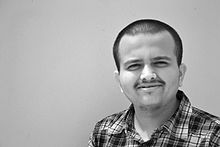
“The overall experience of TTT program was quite uniquely satisfactory.” said Rangilo Gujarati.
|
| Participants gave an above average rating of 8.25 on a scale of 10. We believe this high number indicates that CIS-A2K’s was able to inspire more volunteers to conduct online and offline outreach activities to grow their Wikimedia communities. |
- New Learnings – “It was a good experience for me. I learned a lot of things by interacting with so many TTT participants from different communities. The sessions were extremely useful and informative”, said Pranayraj1985, an active Telugu Wikipedian. Most participants got to learn new things during the course of four day workshop. The question ‘Do you feel you got to learn new things from TTT workshops?’ got an average rating 8.58.
- Feedback on various sessions – One of the participants said “All workshops were excellent. The event managed to cover different aspects such as crowdsourcing, copyright, social media, digitization, media wiki etc. There was bit of everything to match everyone’s taste. Each one of the sessions gave a lot of energy to Wikipedians. These types of programs should be conducted often. Thanks for giving us the opportunity.”
- Presenting with Impact I & II was the most liked session according to feedback. DIY digitization led by Malayalam Wikipedian Vishwa Prabha and Odia Wikipedian Subhashish Panagrahi also received a high ranking. This was followed by Copyright CC and Wikimedia led by Achal Prabhala.
- Sessions such as Spectogram, Accessing Media Wiki Data, Wikimedia India Chapter – History & Present were found to be less useful. This could be due to the fact that some of the participants already had sufficient knowledge about the topic or were simply not interested in the topic.
|
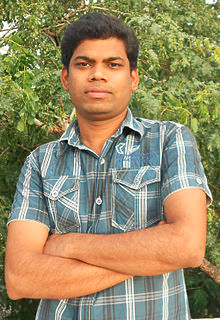
“It was a good experience for me. The sessions were extremely useful and informative”, said Pranayraj1985
|
- Follow up Session – 92 percent of the participants recommend CIS-A2K organize a follow-up session for them in the coming months. Eight percent of them did not think it’s required. One of the resource persons from Malayalam community, Vishwa Prabha, offered to organize the follow-up meet in Kerala. He said, “December would be a good time for a follow-up meet, I would like to suggest Alappuzha (Kerala) as a venue. This could be scheduled just before or just after the WikiSangamotsavam, which is being planned by the ML community. This could also be a great opportunity for TTT members to interact with the ML community, one of the most vibrant wiki communities in Asia.”
- Recommendation to other Wikimedians – 83 percent of the participants said that if another TTT program was t be organized they will recommend it to their fellow Wikimedian volunteers; while 17 percent of them won’t.
|
CIS-A2K’s Findings II
All participants unanimously suggested that CIS-A2K continue this program in the future and offered suggestions to improve it next time:
- Organize more ice-breaking activities – Even after a four day workshop a lot of participants thought they didn’t get enough time to get to know volunteers from other language communities. This was owing to the fact that participants had relatively little free time. Communication in a multilingual environment was also rather difficult for some.
- Provide longer breaks – Some participants complained that the length of breaks were too short. “While trying to stuff in so many topics (all of them being quite essential and worthy) within such a short time, the breaks seemed too short,” said one participant.
- Organize parallel and optional sessions – There were some participants who were not interested in technical aspects of Wikimedia projects such as Python or MediaWiki and would have liked the option of attending a parallel non-technical session. One of the participants said “Let us say for example, not everyone is interested in knowing how to access media wiki data using XML, so why force the participants to attend, even if they don’t want to. What could have been done is, some other kind of session/talk or extension of any previous session in parallel so folks uninterested in XML can attend that.” If scale permits, CIS-A2K will aim to organize parallel sessions so that the participants can choose the session they’d like to attend.
|
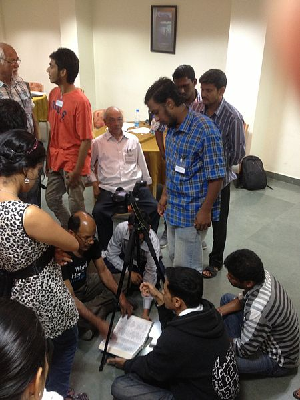
Wikipedians during at the CIS-A2K Train-the-Trainer Program Digitization workshop (by Subhashish Panigrahi, CC-BY-SA 3.0)
|
- Provide ideas and action points – Providing a report and case study on how TTT participants can infuse the lessons learned into their outreach and community activities would have been helpful. CIS-A2K was informed that the participants were highly encouraged and motivated to strengthen their language communities but didn’t know where to start or whom to reach out for help.
- Create Wiki Projects for TTT participants – One of the attendees suggested that we should initiate some intra-community collaboration projects (like railway network, Bibliography database, taxonomy database, reusable standard templates among Indic communities etc) and ask participants to volunteer on these projects with a common goal. This will help break barriers as well as help volunteers get to know each other better. Another attendee said, “Another way could be to ask them to work towards creating a repository of outreach material (coursebooks, presentation modules, standards/workflows, PR, media, publicity and courses) for each Indian language community.”
- Organize advanced technical sessions – A few participants would have liked more technical sessions such as bat running, edit tools, web linkups etc. CIS-A2K got requests to invite experts and organize more advanced technical sessions.
|
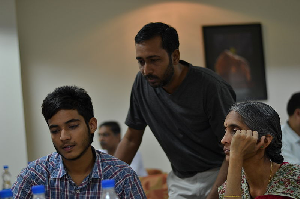
Participants during Information literacy and Internet research techniques for Wikipedia editors (by Subhashish Panigrahi, CC-BY-SA 3.0)
|
Conclusion
Overall, the participants and resource persons were satisfied with India’s first ever Wikimedia Train the Trainer Program. A special thanks to all the participants and the resource persons who gave their time and energy to make this program a success. A list of all participants and resource persons can be found on program meta page.
CIS-A2K will definitely try to incorporate these ideas and suggestions a the second annual TTT program. Please stay tuned to learn more about when and where it will take place!
|
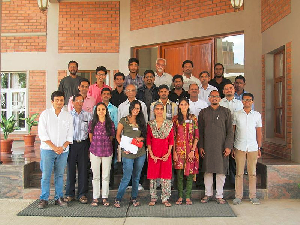
A group photo on the last day (by Pranayraj, CC-BY-SA 3.0)
|
- Copyright notes: "HPN" by HPNadig, under CC-BY-SA 3.0 Unported, from Wikimedia Commons, "Photograph of Rangilo Gujarati" by Rangilo Gujarati, under CC-BY-SA 3.0 Unported, from Wikimedia Commons, "My Photo", "CIS A2K - Train the Trainer Programme.jpg" by Pranayraj1985, under CC-BY-SA 3.0 Unported, from Wikimedia Commons, "CIS-A2K Train-the-Trainer Program11.jpg", "CIS-A2K Train-the-Trainer Program2.jpg" by Subhashish Panigrahi, under CC-BY-SA 3.0 Unported, from Wikimedia Commons
The views and opinions expressed on this page are those of their
individual authors. Unless the opposite is explicitly stated, or unless
the opposite may be reasonably inferred, CIS does not subscribe to these
views and opinions which belong to their individual authors. CIS does
not accept any responsibility, legal or otherwise, for the views and
opinions of these individual authors. For an official statement from CIS
on a particular issue, please contact us directly.






